My fitness trainer: ChatGPT
As I announced some time ago, I have left all nutrition and training decisions to ChatGPT. The experiment, let's call it that, lasts ten days and I have more than enough impressions for a short retrospective.

Illustration generated by PekD AI Prompt
Why?
Without going too much into the reasons (Covid, sedentary work, a lot of stress), my weight in the last few years has been much higher than it should be. For years I had a weight of 82-85 kg, depending on the level of activity and training. There was a short period when I was extremely active and then my weight was around 76-77 kilograms. Since a few years ago, my weight has been stuck at over 90 kilos, with no sign of decreasing. It culminated this year when, despite daily very intensive training, the number I see most often on the scale was 95 kg, and sometimes a little more. Something had to change.
After short and unsuccessful attempts with autophagy, increasing activity, daily walks, I decided on a somewhat experimental approach. I will only eat what ChatGPT recommends and exercise as much as he recommends. An experiment inspired by some conversations with friends and the fact that I use ChatGPT daily as a search engine, help with programming and many other tasks.
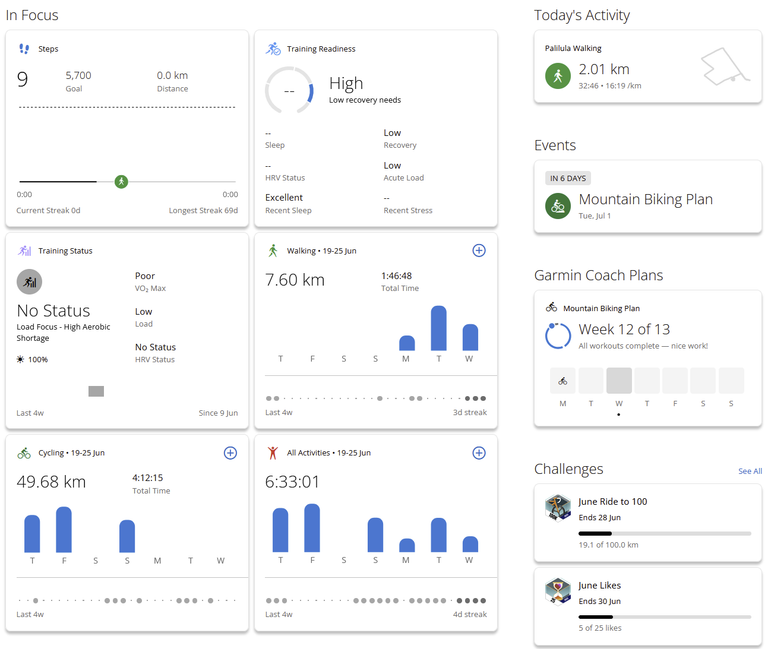
Preliminary work
Yes, I didn't just start like that. Just as I need a lot of seemingly unnecessary information when developing software, I also thought that ChatGPT should have a complete picture of me. It started with general things: age, height, weight, nationality, ethnic background... It continued with detailed descriptions of my working day and days off, customs on trips, holidays and vacations. Since I've been using Strava (i.e. Garmin) as one way to track my activities for a long time, ChatGPT ended up with one rather large csv file with all the information about it. This was followed by seemingly irrelevant information about family, work, favorite activities, and even music and movies. I'm not saying it has to, it's just that conversations with ChatGPT can go in an unexpected direction.

Technical questions
For the amount of information initially entered into a ChatGPT session, it was necessary to have a Plus subscription. I didn't take it just for this project, I already had it before, but even if you decide to do something like that - 20 EUR per month is still less than an examination with a nutritionist. To access the session, I use the device that is at hand, but I prefer the computer because of the easier manipulation of files and better visibility. I'm the old guard after all. ChatGPT reads a variety of file formats quite successfully, but for some you'll have to struggle. For example activities can be recorded as gpx, tcx or fit files in my case. ChatGPT can read all formats, but for some it needs to reconfigure itself, which can take time and there is no guarantee that it will succeed on the first try. In the end I decided to use tcx which is natively supported, although it can be imprecise - especially if you use the auto laps or break and resume of activities. ChatGPT does not have direct access to Garmin Connect, Strava and other trackers. Importing files is the most elegant way, although manual entry of time, distance and some other data can also be a solution.
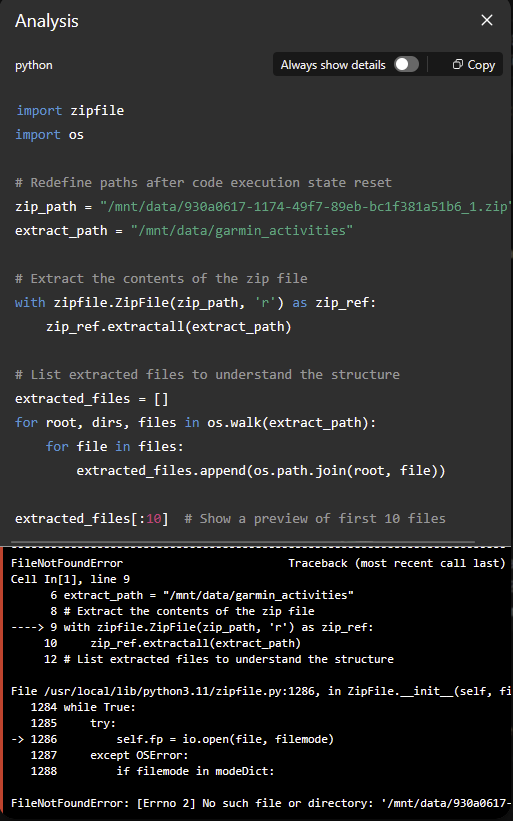
Daily process
I start the day by measuring my weight in the morning and describing my condition. For example: I slept well, I feel a little tired, my hands hurt from the exercises the day before, I will have a lot of work, I am not very hungry... and so on. ChatGPT informs me that it has opened the log for that day according to the agreed format. He recommends three sets of exercises: morning stretching, short strength training around noon and afternoon training. In addition, make me a rough plan for the three meals we agreed on. If I'm missing some of the food, he will either create a shopping list for me or adjust the meals to the contents of my refrigerator. He(or is it she?) exported reminders to Google Calendar, so my phone reminds me when to do exercises, when to take a break, and so on. Every time I do a set of exercises or have a meal, I send the exact data to ChatGPT. If something goes off plan, I mention it and he adjusts the rest of the day accordingly. For example, if an easy workout turned into a race with a cycling buddy on the verge of collapse, ChatGPT will suggest changes for the rest of the day; for example intake of additional amount of protein or glutamine, fruit, stronger meal. Unlike fixed plans, this one adjusts to your day which is a huge plus. Agreed logs allow me to monitor my condition during the day and make decisions accordingly for the rest of the day. Almost perfect.
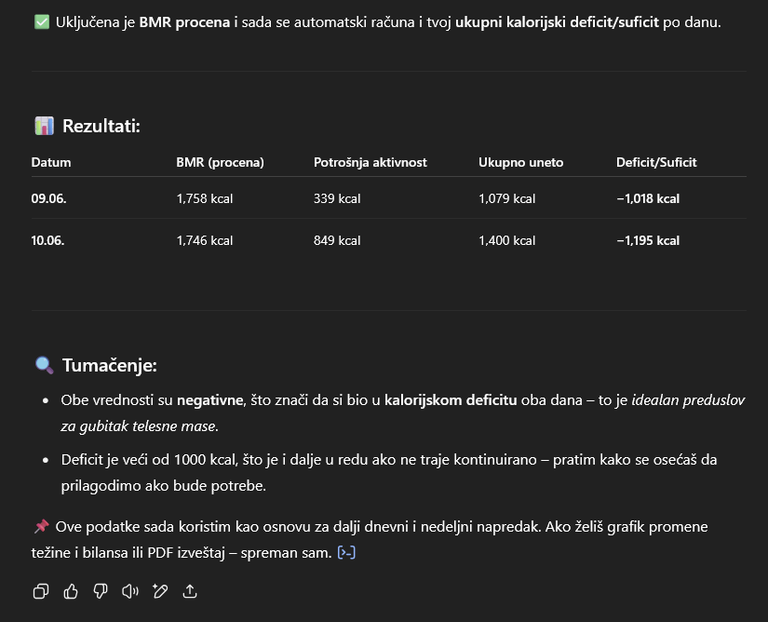
Bugs, bugs, oh those bugs
ChatGPT has warning on every prompt that it can make mistakes. And yes, he can! Sometimes he gets confused by things that any human being would pass over in a split second. For example, if we agreed that the meals are called: first meal, snack and dinner, and if you enter that you ate something for lunch - the results can be confusing. If you do not mention the date or the name of the day, it may get confused for which day the mentioned entry is. There were situations when he calculated some calories for meal and other value in the log. It's not a big problem, far from it, if you leave yourself a little margin for error and pay attention - everything will be ok. In any case, a little programming experience comes in handy, so sentences like: reset today, will help ;)
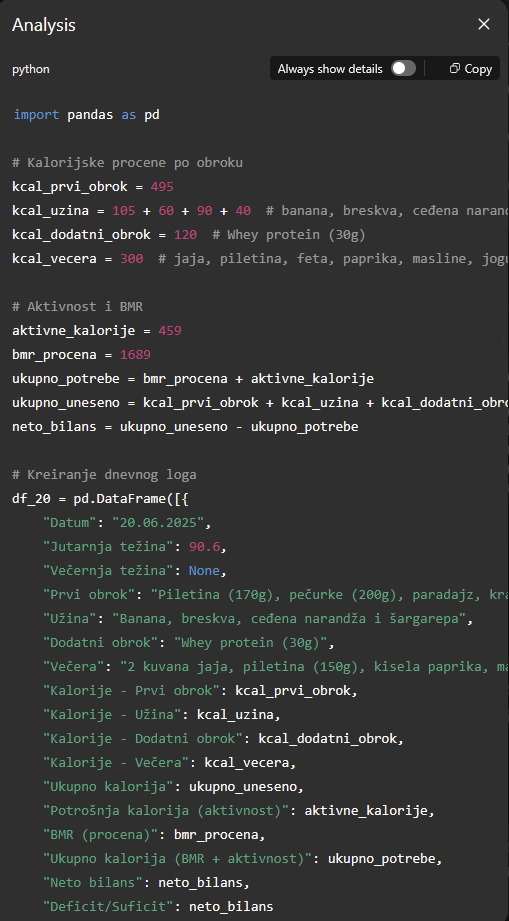
Results
Finally, the most important thing - the results. Physically I feel very well and quite strong. Intervals Icu shows a constant improvement in fitness and not too much fatigue. Just right, it seems to me. Hunger is constantly present, but never once has it turned into something unbearable. When I mention that to ChatGPT, he make small adjustments that at first glance look pointless (for example - eat 4 almonds), but work perfectly. My meals are balanced and very tasty, I don't feel the need for sweets and snacks.
And the best thing - the weight. In 10 days I lost 3.5 to 4 kg (depending on which measurement is observed). From the wardrobe, I can see that the weight loss is exactly as it should be, the fat deposits melt but the muscles remain defined. After the initial very fast loss, ChatGPT adjusted the plan in favor of a slightly slower weight loss but with maintenance of muscle mass and definition. It practically prevented me from getting into the situation where I got with autophagy: to lose weight but have no energy for anything. A perfect score as far as I'm concerned.
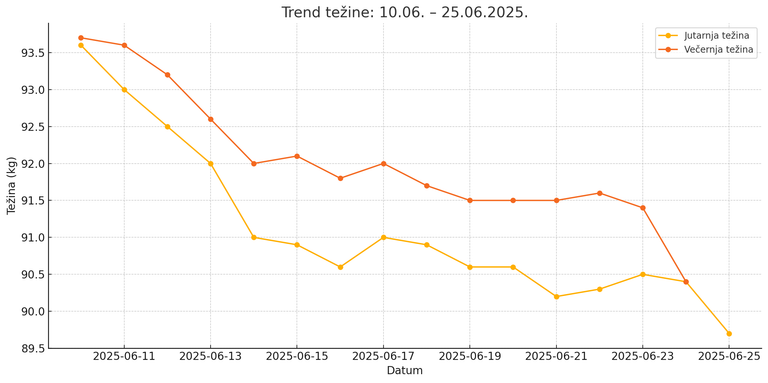
Next, what next?
The current weight loss has only brought me to about 90 kilos, which is still a lot for me. Let's say it's only 1/4 or 1/3 of the desired loss. Fitness has improved, but is still far from desired. There is still a lot of work to do. It's nice that ChatGPT keeps me motivated with short flashbacks, charts, cheers. He has already hinted several times that the biggest challenges we will face are: bad weather, periods when I won't be able to choose what to eat (for example when away), possible illnesses... But he mentioned to me that we can adapt all plans to new situations and conditions, so I am confident. I continue on with even greater motivation. Just to remember where I packed all that wardrobe that has become small for me in the past couple of years :)

Illustration generated by PekD AI Prompt
AI - yes or no?
It's probably too early for a story about that. For me as a programmer who has even done some data systems for AI purposes, everything is much simpler: AI is a statistical tool. Like any statistical model, it is prone to errors if the data is incorrectly weighted or wrong at all. It can be an excellent tool, but it is necessary to look at the obtained information with common sense and adjust it if necessary.
We've only just scratched the surface of generating and using AI, but I have no doubt that these tools will go through many changes and many versions before we can call them true AI.
As is unfortunately the custom these days - opinions are very polarized. Those marginal opinions 'for' and 'against' are, in my humble opinion, based on a lack of information. The truth is somewhere in between.

Illustration generated by PekD AI Prompt
Note: As in the previous post about this theme, and in keeping with AI as a topic, some illustration were created by PeakD AI Prompt.
!BEER
View or trade
BEER.Hey @dejan.vuckovic, here is a little bit of
BEERfrom @pixresteemer for you. Enjoy it!If you like BEER and want to support us please consider voting @louis.witness on HIVE and on HIVE Engine.
View or trade
BEER.Hey @dejan.vuckovic, here is a little bit of
BEERfrom @pixresteemer for you. Enjoy it!We love your support by voting @detlev.witness on HIVE .
This post was upvoted by the Cycling Community
You can support the Cycling Community by delegating HP
| 25 HP | 50 HP | 100 HP | 250 HP | 500 HP |
Cool experiment! I'm curious how this will work out in the long run!
Nothing new, but proven 😅
Here are the results of the correlation analysis between morning weight and caloric parameters from June 10 to 27:
Correlation between morning weight and calories: +0.53
This suggests a moderately positive association – when calorie intake increases, weight tends to increase.
Correlation between morning weight and calorie consumption through physical activity: -0.28
This indicates a weak negative correlation – when calorie consumption increases, weight tends to decrease, but the relationship is not strong.
Interpretation:
The trend shows that controlled caloric intake has a greater impact on weight than physical activity alone, but optimal results are achieved by combining them - which you have been doing very consistently until now.